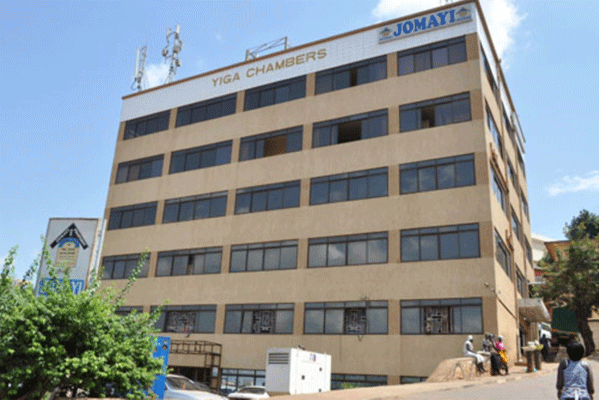Prime
A property wrangle at the heart of Jomayi

People walk past a section of Jomayi Property Consultant offices in Kampala owned by Mr Joseph Yiga Magandazi. The company is involved in a land wrangle at one of its estates in Nakaseeta village, Namataba, Mukono District. Photo by Rachel Mabala
What you need to know:
Following on a lead that was relayed by a caller from Qatar, this newspaper discovers a property wrangle involving real estate agency, Jomayi. Betty Ndagire followed the story and below she bring you details.
On June 23, an unfamiliar number flashed on my phone screen alerting me of an incoming call that would for at least send me on a two-day errand in Mukono District.
It had been a long day at office but I was immediately drawn into the call after a lady on the other side of the line relayed her dilemma that she had lived with for at least four months.
The narrative as she told it was nothing new but was something that I had not taken keen interest into until that day.
Speaking in a mixture of Luganda and English, Allen Kyampaire, who said she had left Kampala to work in Qatar, brought me to speed, telling me how she and others might have fallen in a trap involving land purchased from property consultant, Jomayi.
Through a relative, she had been informed of an alleged wrangle between Jomayi and the land seller, who as she said she did not know.
The property in question, sits on a 163.5 acre piece of land off Jinja Road in Nakaseeta village, Namataba, Mukono District.
This property as we later found out was bought by Jomayi with the first agreement of sale being drawn and signed on September 4, 2014.
However, there were subsequent amendments drawn by Jomayi and Washington Kinene Mukasa, the land seller prompted by different narratives, key among them failure to pay and presence of squatters on a section of the land.
How it all started
In November 2014, Kyampaire, who was in Kampala for her routine annual holidays, was alerted to a Jomayi estate in Namataba through media adverts and after making due diligence, including site visits she proceeded to buy a plot in the said estate.
She had been convinced it was a good buy considering the hilly scenery of the property, overlooking Nakaseeta village.
However, back in Qatar, on February 16, as Kyampaire narrates, through a relative she was told of a story, pointing to a possible disagreement between Kinene and Jomayi as a result of non - payment.
Her fear was that she had heard of another court case involving Jomayi and an army officer – Henry Tumukunde.
Thus, as she said, she never wanted to get into a similar will-wand, not considering that she was preparing to start building on the same property.
Our findings
In July 2014, Kinene was contacted by an agent, saying he had someone with keen interest in the purchase of his property in Nakaseeta village on plot 152 and 257.
After a number of modalities, which took over two months, a purchase – sale agreement of Shs1.1b was drawn and signed on September 4, 2014, detailing the acreage of the property (163.5) and a payment schedule running between October and January 2014/15.
The schedule required that Jomayi makes a payment of Shs280m by October 30, 2014 with other payments of Shs246.6m, Shs256.6m, and Shs266.8m coming in by November 30, 2014, December 30, 2014 and January 30, 2014 respectively.
However, none of these payments were remitted on claims that a section of the land on plot 257 had some encumbrances [squatters] who had claims to the land dating to the 1930s.
Thus, Jomayi had decided that he would cease any claim to the land in question not considering that he had already developed a section of it through road works, grading and excavations. However, he committed to pay for the land on plot 165 measuring 57 acres.
Subsequently on March 19, 2015 an amendment to the earlier agreement was drawn and signed on the same day.
In the new agreement Jomayi would pay about Shs383.54m for the 57 acre piece of land within 90 days of signing.
However, after the expiry of 90 days on June 19, only Shs73m had been remitted, prompting impatience on the part of Kinene, who through his lawyer Stephen Mungoma and his own efforts had pursued Jomayi to pay in vain.
Unaware of what was going on, tenants continued to buy sections of the land but could not be issued with titles since Kinene had refused to transfer the mother title, swearing he would only do it after Jomayi had fully paid.
Jomay vs Kinene
At his home in Bunyagira village, Kawolo Sub-county, Mukono District, Kinene, who had taken a siesta in a section of his expanse compound, welcomed this reporter to a rare fruit (kitaferi), before narrating how he was tired of the Jomayi narrative.
“Jomayi mukumpanya ate mulimba,” (loosely translated to mean ‘Jomayi is a cheat and a liar’), he said after I had relayed to him my reasons for paying him a courtesy call.
Seated in his guest room that is decorated with pictures, Kinene, 81, gives a vivid impression of how the whole story started, before divulging into the story of how he hosted the Katikiro, Charles Peter Mayega, who had visited the area for his routine etoofali campaign.
Pictures of Kinene and the Katikiro are prominently displayed in his sitting room and this seems to be his source of pride as our conversation is routinely interrupted by chest thumping of “Nze ndi musajja wa Kabaka”, (I am a Kabaka’s subject).
The Jomayi story
Joseph Yiga Magandazi is the proprietor of Jomayi and managing director of one of Uganda’s longest surviving real estate agency cum consultants.
At the company’s offices in Old Kampala, Patrick Mwidu, the Jomayi Property Consultants general manager told this reporter he was aware of the issues concerning the land but they were being sorted.
He said they had been in discussion with Kinene, thus there was nothing alarming that would unsettle tenants on the land.
However, when asked why they had flouted on their payment schedules yet they were selling plots on the land, Mwidu said they had had issues with cash flow, but that would be sorted.
But when reminded that Kinene had been expecting payment the previous day (July 9, 2015) and was now feeling frustrated Mwidu said “as I told you we have challenges of cash flow and I would understand if he (Kinene) is frustrated.
Yiga Magandazi speaks
Magandazi, who had earlier refused to speak to this newspaper later, told this reporter in a meeting they (Jomayi) had drawn a new understanding that would as well cater for tenants who had already bought land.
The new understanding, as we later learned is cognizant of the fact that some plots on the land had already been sold thus, it puts in mind that such tenants including the likes of Kyampaire are unsettled.
The agreement, which was signed last week (July 9), cancels out the earlier ones and details out payment terms and areas from where the land would be curved.
According to the agreement, Jomayi will only purchase 38.5 acres curved out of plot 152 at Shs256.0m.
The money, the agreement says, will be paid within 60 days of the signing failure of which bank interest rates would be instituted.
However, considering that Jomayi had previously deposited Shs73m in earlier commitments, means that the company will be required to pay Shs186.05m in the stipulated time.
The story of a squatter and the law
At 65 years, Vincent Oloka Owino does not know any other home, having inherited 40 acres of land from his father at Nakaseeta village.
The family’s claim to the land dates back to 1930 but Magandazi (Pictured above) and Kinene challenge this, saying Owino’s claim to the land is illegitimate.
The counter claims, as Owino told this reporter at Nakaseeta village, prompted him to go to the President’s Office to seek a fair hearing.
At the President’s Office a directive, according to Owino was issued demanding that in the event of any eviction the parties involved must ensure that each is fairly treated.
Whereas some squatters left the land after they were paid, Owino chose to stay, demanding that whoever buys the land must parcel out at least 17 acres out of the 40 where he can farm and stay.
However he said, given a good compensation offer, he might consider leaving.
What the law says
For a squatter to take ownership of another person’s land through adverse possession, he must satisfy four basic criteria, including taking actual, exclusive possession of the land, either through residential occupation or commercial for a period of not less than 10 years.
The squatter must also ensure that he or she uses the land openly and obvious as well as ensuring the use is exclusive, and not shared with the owner or another possessor. The use of such property must also adversely encroach the owner’s interests. The squatter’s use must be continuous and uninterrupted for a statutory period of not less than 10 years.
How to avoid land fraud
Stories of fraud related to land purchases have been a common feature in Uganda’s property market becoming another defining episode in the real estate industry.
A number of real estate agencies, including Hossana and Property Masters have collapsed under their own weight vanishing with their clients’ money and leaving a litany of court cases.
However, Ivan Kyeyune, a property lawyer in Kampala, advises that people have got to become very careful every time they want to buy land, considering that even well established companies have been victims or accomplices in land fraud.
“Although it is difficult but try and establish if the land you are buying is from a trusted source,” he says.
He says it is not enough to know the person you are buying land from but you must be able to do due diligence, including establishing the land’s true existence from either the Ministry of Lands or the District Land Boards.
“Even after establishing such things there is need for exercising more caution as you might be given a fake land title. So instead of losing your hard-earned money follow the process to the end,” he says.
Additional reporting by Othman Semakula




